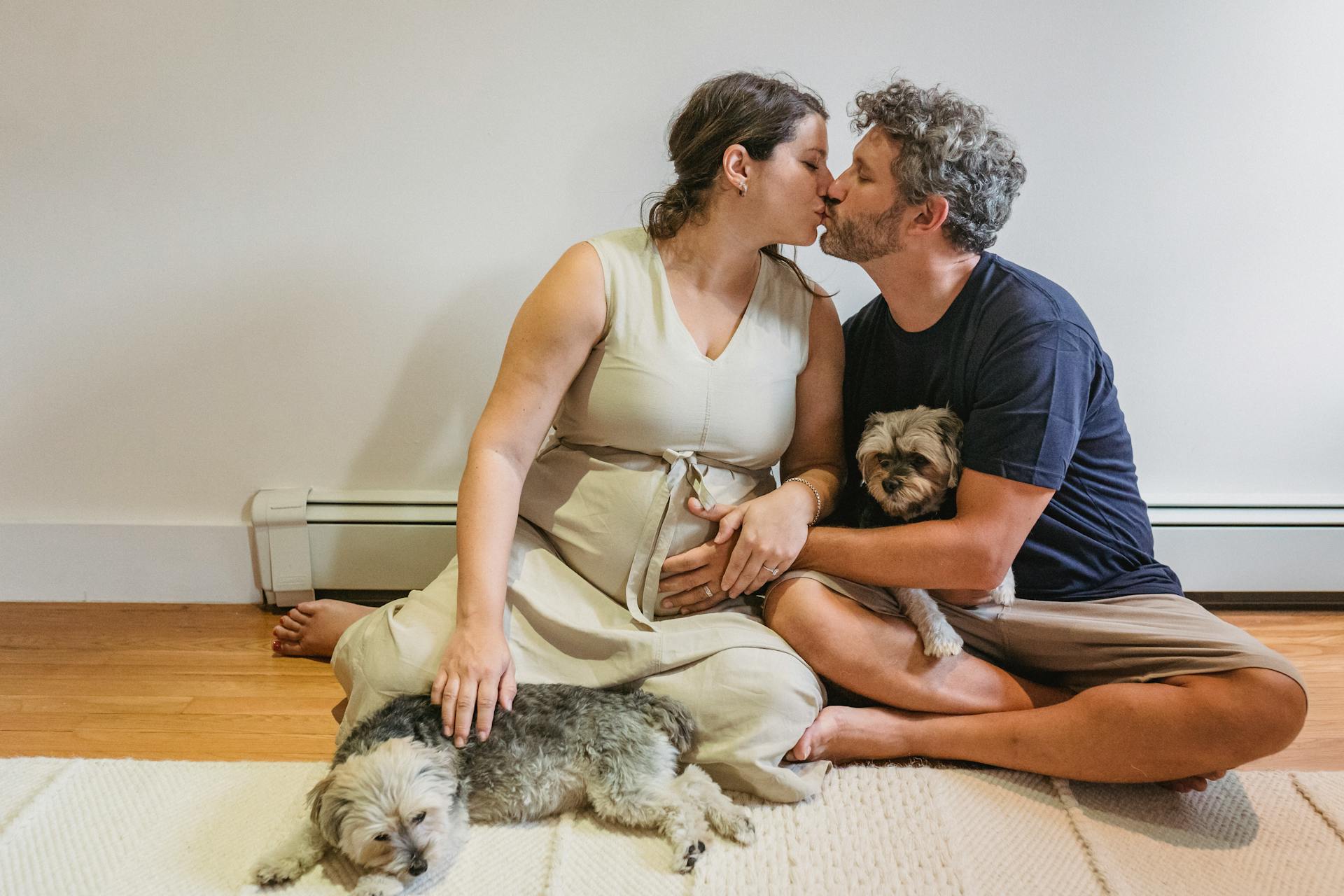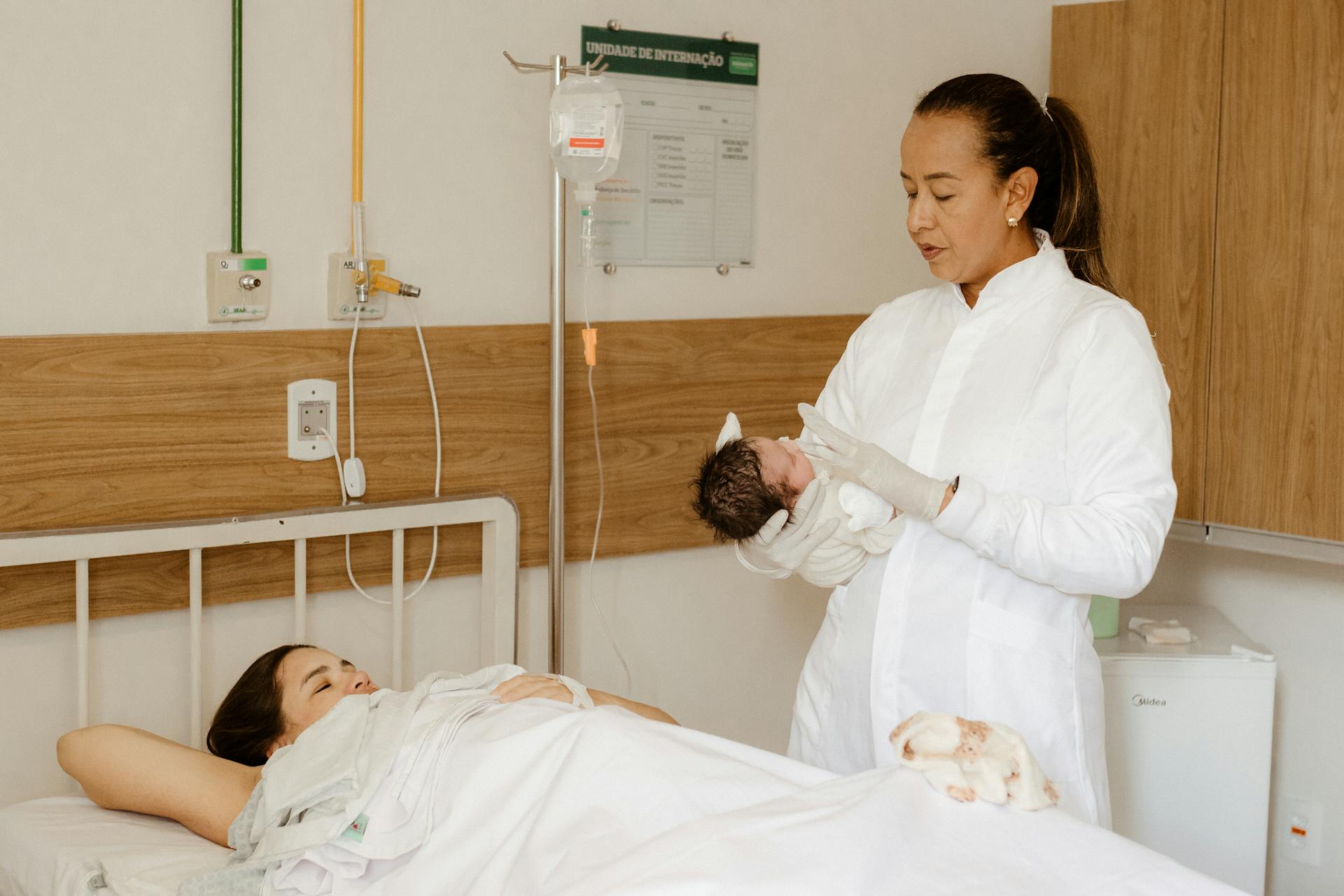
Boston Terriers typically give birth to 2-6 puppies in a litter, with an average litter size of 4. This is a relatively small litter size compared to other breeds.
As a responsible breeder, it's essential to monitor the mother's health and well-being throughout the pregnancy and after birth. Boston Terriers are prone to certain health issues, such as brachycephalic syndrome and patellar luxation, which can make whelping more complicated.
Boston Terriers usually give birth between 58-68 days of gestation, with a normal range of 56-72 days. This timeframe is crucial to ensure the puppies receive proper care and nutrition.
A whelping box or safe and comfortable area should be prepared in advance to ensure the mother's and puppies' safety during the birthing process.
Related reading: Female Dog after Giving Birth
Pregnancy and Delivery Basics
A Boston Terrier's pregnancy typically lasts about 63 days, but this can vary slightly.
It's essential to ensure your Boston Terrier has reached at least 18 months of age before breeding, as this allows her to be fully matured and reduces the risk of complications.
As the pregnancy progresses, you can expect to see a gradual increase in belly size, more frequent napping, and changes in appetite. These natural shifts mark the stages of development as the due date approaches.
Curious to learn more? Check out: Boston Terrier Pregnancy
Identifying Pregnancy Symptoms

Identifying Pregnancy Symptoms can be both exciting and a bit challenging, given that the initial symptoms are often subtle. A Boston Terrier's pregnancy typically lasts about 63 days, but this can vary slightly.
As the weeks progress, you may notice a noticeable weight gain, with the belly rounding out due to the growing fetuses. The increase in appetite is another early sign, with the pregnant dog's appetite likely increasing to support the growing demand for nutrients from the developing puppies.
Nipple growth and color change are also significant indicators, with the nipples becoming more prominent, larger, and may darken in color as they prepare for milk production. You can also observe a moderate amount of clear, sticky vaginal discharge, which is normal for a pregnant dog, especially close to delivery of the puppies.
Here are some key signs to look out for:
- Weight Gain: The belly rounds out due to the growing fetuses.
- Increased Appetite: The pregnant dog's appetite increases to support the growing demand for nutrients.
- Nipple Growth and Color Change: The nipples become more prominent, larger, and may darken in color.
- Clear, Sticky Vaginal Discharge: A moderate amount of clear, sticky vaginal discharge is normal close to delivery.
These natural shifts mark the stages of development as the due date approaches. It's essential to seek veterinary advice to confirm the pregnancy and receive tailored guidance.
Can Terriers Have Natural Births?
Boston Terriers can have natural births, but it's essential to consider the size of the dad. If the male is significantly larger than the female, issues may arise.
A larger male can cause problems, such as puppies being too big to fit through the cervix, which might require a C-section.
You might like: Boston Terrier Lifespan Male
Preparing for Birth
As your Boston Terrier's due date approaches, it's essential to ensure that everything is in place for a smooth, stress-free delivery. This means setting up a whelping box, a safe and comfortable space for your dog to give birth.
You can purchase a whelping box or even use a small children's plastic swimming pool. Just make sure it's easy for the mother to get in and out of, but not the puppies. Your dog may prefer to have it in a quiet area of the house, but in an area that you can have easy access.
It's also a good idea to introduce your dog to the whelping box before the birth, so she gets used to it. If you don't, she might decide to deliver somewhere else – like your closet!
Discover more: Yorkie Dog Giving Birth
If this is your first time breeding your dog, talk to your veterinarian about your role during labor, and read up on what you need to know. Unless you have an experienced breeder on hand, you'll need to be prepared to step in when necessary during the whelping process.
Here's a list of essential supplies you'll need to have on hand:
- Lots of newspaper to line the whelping box during delivery for easy cleanup
- Non-skid bath mats for bedding after whelping is done
- Dry, clean towels to clean the puppies
- Paper towels to help with clean up
- Thermometer to check your dog's temperature before whelping
- Clean, sterilized scissors to cut the umbilical cords
- Unwaxed dental floss to tie off the umbilical cords
- Iodine to clean the puppies' abdomens after the cord is cut and dab on the end of the cut umbilical cord
- Heat lamp set high above the box on one corner only to keep the puppies warm
- Bulb syringe to clean puppies' nose and mouth
- A baby scale in ounces
- Honey or light corn syrup
- Veterinarian's phone number and the number of a nearby emergency clinic
By having these supplies ready, you'll be well-prepared for the birth and can focus on supporting your dog through this important process.
Signs of Labor and Pre-Labor
As your Boston Terrier's due date approaches, it's essential to know the signs of labor and pre-labor to ensure you're prepared for the big day.
About 24 hours before labor starts, your Boston Terrier's body temperature will drop below 100°F (37.8°C), so begin taking her temperature twice daily as the due date approaches to catch this sign.
Restlessness, nesting behavior, loss of appetite, and panting are all behavioral changes that indicate labor is imminent. I've seen my friend's Boston Terrier start to pace back and forth in her crate, clearly feeling the urge to get comfortable for the upcoming delivery.
A moderate amount of clear, sticky vaginal discharge is normal for a pregnant dog, especially close to delivery of the puppies. This is caused by increased hormone levels that stimulate vaginal lubrication.
Here are the key signs of labor and pre-labor to watch for in your Boston Terrier:
- Temperature Drop: Below 100°F (37.8°C)
- Behavioral Changes: Restlessness, nesting behavior, loss of appetite, and panting
- Clear, Sticky Vaginal Discharge: Normal for pregnant dogs close to delivery
Caring for Mother and Puppies
A Boston terrier mom will typically give birth to 2-6 puppies after a gestation period of about 63 days. The mother will take care of the newborns, but it's essential for you to monitor her and the puppies closely to ensure they're healthy and thriving.
Keep the whelping area clean and quiet to reduce stress on the mother and puppies. A whelping box or a quiet room with a heat source is ideal.
The mother will nurse the puppies, but you should still weigh them daily to monitor their growth and overall health.
Curious to learn more? Check out: How Big Will My Boston Terrier Get
Caring for Mothers
Caring for Mothers is an essential part of ensuring the health and well-being of both the mother and her puppies. The mother's nutritional needs will be significantly higher during lactation, so provide a high-quality, nutrient-rich diet to support milk production.
Fresh water should always be available, as nursing dogs require more fluids. It's also crucial to monitor the mother for signs of postpartum complications, such as infection, lack of interest in her puppies, excessive bleeding, or unusual discharge.
To keep the mother comfortable, ensure she has a quiet place to rest and nurse her puppies. She should also have the opportunity to take short breaks for bathroom trips and a little exercise.
Worth a look: Boston Terrier Mixed Breeds
Caring for Newborn Puppies
Caring for Newborn Puppies is a delicate and crucial task. Newborn puppies should begin nursing within the first couple of hours after birth. Monitor the puppies to ensure they are latching properly and feeding regularly.
Puppies cannot regulate their body temperature for the first few weeks, so it's essential to keep the whelping box in a warm, draft-free area. Consider using a heat lamp or heating pad, making sure there is enough space for the puppies to move away from the heat source if they become too warm.
Check this out: Boston Terrier Puppies Newborn
Weigh the puppies daily for the first few weeks to ensure they are gaining weight. A healthy puppy should steadily gain weight each day. This will help you detect any potential health issues early on.
Here are the key things to monitor for in the first few weeks:
Regular health checks are crucial to ensure the puppies are healthy and developing normally. Early detection of health issues is key to prompt treatment and a healthy outcome.
Readers also liked: Common Boston Terrier Health Issues
Do Terriers Need C-Section?
Boston Terriers often need to have Cesarean sections due to their unique physical characteristics. This is because the cute chubby face and broad shoulders of the puppies may not fit through the skinny hips of the mother.
Some breeds are a little trickier than others when it comes to natural births, and Boston Terriers are one of them. This is why it's essential to consult with your vet on what's best for your Boston.
A c-section is a surgical procedure to remove all of the puppies from mom's uterus, and many times, these can be planned. Your veterinarian will determine what day is best for the c-section so that all puppies will live.
Radiographs can be taken of the mother a few days before the expected birthing date to determine if the puppies will fit through the birth canal or if a c-section will be needed.
Take a look at this: Blue Boston Terrier Puppies
Veterinary Care
As a Boston Terrier owner, it's essential to have a plan in place for veterinary care during and after birth. Schedule a postnatal check-up for the mother within 24 hours after delivery to ensure there are no retained placentas or other complications.
Your veterinarian will examine the mother and puppies to confirm they are healthy and developing normally. They may also discuss a vaccination and deworming schedule with you. Puppies typically receive their first round of vaccinations between 6 to 8 weeks of age.
Before breeding your dog, take her to the vet for a prenatal checkup to ensure she's up-to-date on vaccinations. Your vet may recommend a fecal exam or de-worming medication prior to mating.
A veterinarian can also help you determine if a normal birth or cesarean may be necessary. If you're expecting a litter, it's a good idea to discuss this with your vet ahead of time.
Here is a summary of the recommended veterinary care for your Boston Terrier:
- Initial check-up: within 24 hours after delivery
- Vaccinations: typically between 6 to 8 weeks of age
- Deworming: may be recommended prior to mating or during pregnancy
- Pre-breeding checkup: ensure your dog is up-to-date on vaccinations
- Ultrasound: can be used to confirm pregnancy and estimate delivery date
Pregnancy and Whelping Details
A Boston Terrier's pregnancy typically lasts about 63 days, but this can vary slightly.
To confirm the pregnancy, it's crucial to seek veterinary advice and receive tailored guidance.
You can expect a gradual increase in belly size, more frequent napping, and changes in appetite as the pregnancy progresses.
Here are some signs of pregnancy to look out for:
- Weight gain: This is when you'll start to see noticeable weight gain, with the belly rounding out due to the growing fetuses.
- Increased appetite: As the pregnancy progresses, her appetite will likely increase to support the growing demand for nutrients from the developing puppies.
- Nipple growth and color change: The nipples become more prominent, larger, and may darken in color as they prepare for milk production.
Dogs are pregnant for approximately 62-64 days, or about two months, although the exact timing can vary with breed and litter size.
Weeks 3-4: Veterinary Confirmation

At around 25-30 days of gestation, your veterinarian can perform a blood test to measure the dog's hormone levels to see if she is producing the hormone relaxin, which is only produced during pregnancy.
This test is relatively accurate, making it a reliable way to confirm pregnancy.
Your veterinarian can also perform an ultrasound between 25 and 35 days of gestation to detect fetal heartbeats and estimate the number of puppies the bitch is carrying.
The puppies' heartbeats are 2-to-3 times faster than the mother's, making this a great way to get an accurate count of the number of puppies.
If you're planning to have your veterinarian help with the birthing, they can also use ultrasound to see how the puppies are developing and give you a reasonable estimation of the delivery date.
Here are the diagnostic testing methods mentioned in the article, along with their corresponding time frames:
- Palpation: 28-30 days
- Ultrasound: 25-35 days
- Hormone test: 25-30 days
- X-ray: 55 days or more
How Long Are Dogs Pregnant?
Dogs are pregnant for approximately 62-64 days, or about two months. This timeframe can vary slightly with breed and litter size.
The fertilized eggs travel to the uterine horn and embed themselves in the lining at about 15-18 days. Fetal growth is rapid during early pregnancy, and these swellings double in diameter every 7 days.
By the end of the first month, a veterinarian can detect a fetal heartbeat, and the development speeds up into the second month as the embryos develop into recognizable puppies. This is a critical period for the puppies' growth and development.
A Boston Terrier's pregnancy typically lasts about 63 days, which is slightly longer than the average dog pregnancy. It's essential to seek veterinary advice to confirm the pregnancy and receive tailored guidance.
Here's a rough breakdown of the pregnancy duration:
What Is the Average Litter Size for a Terrier?
Most Boston Terriers will have around 3 to 5 puppies in each litter.
A radiograph is better than an ultrasound for counting puppies because it's easier to count a puppy twice with so many in a tiny area.
Troubleshooting and Complications
If your Boston Terrier is having trouble giving birth, it's essential to know the signs of potential complications. If your dog's rectal temperature dropped more than 24 hours ago and labor isn’t starting, it's a cause for concern.
Be aware of the following warning signs: severe discomfort, no delivery of the first puppy 2 hours after contractions begin, or a prolonged gap between puppy deliveries. If you notice any of these signs, it's crucial to call your veterinarian immediately.
Here are some key indicators of trouble:
- Contractions for an hour without a birth
- The mother seems exhausted
- Trembling, collapsing, or shivering
- Green discharge before the first puppy
- No signs of whelping 64 days after mating
- All the placentas aren’t delivered
- Puppies aren’t nursing
Odd Behaviors
As you're waiting for your Boston Terrier to give birth, you might notice some unusual behaviors. She may start hiding in strange places, which is a sign that she's getting ready to start the birthing process.
Her pacing around the house and seeming uncomfortable are also common signs that labor is imminent. These behaviors can be a bit unsettling, but they're a natural part of the process.

If you notice your Boston Terrier acting this way, it's essential to keep a close eye on her. You can also take her temperature twice daily to catch the temperature drop sign, which usually occurs about 24 hours before labor starts.
Here are some signs of labor to watch for:
- Temperature Drop: A body temperature below 100°F (37.8°C)
- Behavioral Changes: Restlessness, nesting behavior, loss of appetite, and panting
Dog Labor Complications
Dog Labor Complications can be a stressful and overwhelming experience for any dog owner. If your dog's rectal temperature has dropped more than 24 hours ago and labor isn't starting, it's time to seek veterinary care.
The mother's symptoms of severe discomfort, especially if she doesn't deliver the first puppy 2 hours after contractions begin, are a red flag. Green discharge before the first puppy is also a warning sign that requires immediate attention.
Strong contractions for an hour without a birth or if the mother seems exhausted are clear signs of trouble. Trembling, collapsing, or shivering are warning signs of serious complications that could put both the bitch and the puppies at risk.
You might enjoy: Female Dog First Heat Cycle
A delay in the delivery of puppies, with more than 2 hours passing between births, is a cause for concern. If all of the placentas aren't delivered or puppies aren't nursing, it's essential to seek veterinary help.
Here are some signs that indicate your dog is having trouble giving birth:
- Contractions without any puppies.
- A puppy is stuck half in and half out.
- Mom seems very weak and unable to stand.
If you notice any of these signs, it's crucial to seek veterinary care immediately. In most cases, medical intervention is necessary to ensure the safety of both the mother and the puppies.
Frequently Asked Questions
What to do when a dog just gives birth?
When a dog gives birth, provide a high-calorie diet and a safe, private space for her and the puppies, while also monitoring her health and seeking veterinary care if needed. This ensures the best possible care for both mom and her newborns.
Are Boston Terrier puppies born with tails?
Boston Terrier puppies are indeed born with tails, but they are typically very short and can vary in type. Some breeders may also choose to dock or cut the tail before the puppy goes to its new home.
Sources
- https://bostonterrierblog.com/boston-terrier-pregnancy-a-week-by-week-guide
- https://www.bostonterriersociety.com/boston-terrier-birthing-process/
- https://www.bostonterriersecrets.com/category/boston-terrier-pregnancy
- https://www.vetinfo.com/vets/answers/dog-pregnant-and-has-clear-mucus-coming-out-of-her
- https://www.akc.org/expert-advice/dog-breeding/dog-pregnancy-care-prep/
Featured Images: pexels.com


